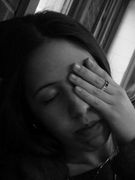
I feel like as I entered high school the word "stress" was just beginning its arduous journey into the lives of all people in every country, on every continent of the world. Prior to this time, no one really used the word and it felt vaguely medicinal; something associated with lab mice or chimpanzees who'd been abandoned by their mothers by sadistic behavioral scientists searching for themes for their books on human development.
Yet, seemingly overnight, everything revolved around stress. "I'm really stressed out" was how we used to say it when it was just coming into vogue and nowadays there's shortcuts galore, "Don't stress," the "out" having been, of course, dropped off the end like so much detritus. "You look really stressy" is also common, just changing it up a bit, tying a little pink ribbon on it's head. "Major stress" is an oft-used turn of phrase as is: "Don't stress," or "Don't stress about it." But what has baffled me since the dawning of the stress epoch is, what exactly is it? Prior to the coming of the stress-age, it was thought that working hard and striving were, well, sort of what was expected. After all, weren't we supposed to try really, really hard and then, if we failed, get pretty upset about it and, if we cared enough, use that pain and humiliation, anger and frustration to try even harder the next time? Weren't we supposed to work our backsides off and have it mean something to us, becoming emotionally invested in our work and then taking time now and then to rest or recuperate from it, only to have renewed energy to try again, to get back out there, to continue on?
The advent of the stress age has helped so many of us to let go of our anger, our frustration and our perfectionism. After all, if we'd continued on as a species of road raging, corporal-punishing, dog-beating lunatics, we wouldn't be here today, creating the incredible reality television shows and oil spills we've come to know so well.
All joking aside, of course learning to lower our blood pressure and increase our insight about our own anger and pent up frustration (aren't these stress-like things?) is so very important for our health, the health of our children and our relationships. Learning to lose gracefully, to have a stable mood throughout the day, to avoid aggressive, confrontational interactions, to treat others with respect, dignity and gentleness, aren't these the goals of "de-stressing" and feeling good about life?
Also, the "fight or flight" response which kicks in automatically when we are under any kind of pressure makes us want to either confront or run away. When unsure, or unable to follow through with either of these we can become stressed out. In the bedroom, this type of stress is called "sexual excitement."
I suppose, as with anything else, all things must be approached with moderation. What one person may deem to be a lack of stress may, in someone else's eyes actually be complacency. And one man or woman's "going for it" (a marathon, a job, a date, an adoption process) may be another's "totally stressed out" state of mind.
So while I still don't know exactly what stress is, I think I feel that some of it is, like chocolate, pretty important, but too much, well, that would really stress me out. For more on stress and your health, please take a read here: http://www.ehealthmd.com/library/stress/str_whatis.html
Aimee Boyle vacillates between relaxation and being completely stressed out on a daily basis. Please read and comment on her blog at http://straightandnarrow.yolasite.com





Add a CommentComments
There are no comments yet. Be the first one and get the conversation started!